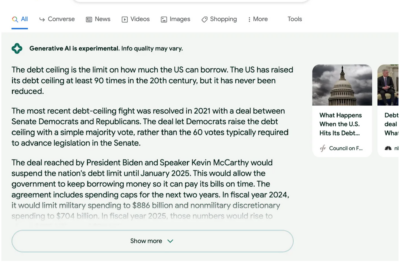What does the future hold for traditional media in the face of Google’s AI plans?
In a bid to hold their position as the number one search engine in the world – Google have announced they will be dipping there toe into the AI world, with a product that will “distill complex information and multiple perspectives into easy-to-digest formats.”
Their product would act as a “text generator plugged into a search engine,” creating short, article style snapshots in response to search queries. And while that may sound innocuous to some, to publishers its a death knell to the delicate ecosystem that they rely on to drive traffic their sites, and keep the journalism business alive.
In its current form Google’s Search Generative Experience will mine the internet for a number of sources and then spit out a concise article style response to a users query.

The development has media executives up in arms, with News Corp. CEO Robert Thomson warning at the INMA World Congress of News Media, “Our content is being harvested and scraped and otherwise ingested to train AI engines. These are super-snippets containing all the effort and insight of great journalism but designed so the reader will never visit a journalism website, thus fatally undermining that journalism.”
The fear is that after eliminating all credible competition, Google and their search engine became the reliable distribution channel for media outlets. With that model now changing (in favour of Google’s interest) media outlets are now at risk of being unable to generate the numbers online needed to sell advertising that keeps their organisations running.
As journalist John Herrman from New York Magazine puts it, “For billions of people, Google is the default interface for the rest of the online world. It’s the portal through which all other sites are accessed. It’s the box — on your phone or your computer or your tablet — with which you interact so often you take it for granted. It’s a de facto governing authority for the parts of the internet that aren’t hidden away inside social platforms and apps and has unparalleled sway over what gets seen online and by how many people.”
Google’s foray into AI also spelled out the loss of AI pioneer Dr Geoffrey Hinton. Dr Hinton is widely regarded as ‘the godfather of AI’, having created (along with two of his graduate students) the technology that became the intellectual foundation for A.I. systems like Chat GPT.
After Google’s announcement around delving into the world of AI in May 2023, Dr Hinton quit his decade long role with the company so that he could freely speak out on the dangers of the technology.
In Dr Hinton’s eyes, Google is no longer acting as a “proper steward” for the technology as they have entered into a race with Microsoft over their augmentation of their search engine Bing with a chatbot.
His main concerns are that the internet will be flooded with false, but undetectable photos, videos and text that the average person will “not be able to know what is true anymore,” and that the race between Google and Microsoft will escalate into a global race.
“I don’t think they should scale this up more until they have understood whether they can control it,” he said in an article from The New York Times.
The AI revolution in search engines comes on the back of another threat to factual reporting, the advancement of AI in photorealistic image making, deepfake video content and audio manipulation.
Speaking with The Guardian, Toby Walsh, the chief scientist at the University of New South Wales AI Institute, cautioned that online media consumers should be questioning anything they see now.
“When it comes to any digital data you see – audio or video – you have to entertain the idea that someone has spoofed it.”
Whether or not AI brings on the end of traditional journalism, it is clear that the media as we know it is under rapid and unstable change.




